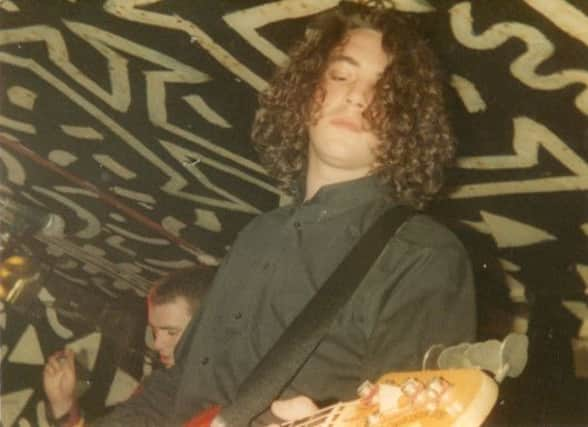Obituary: Robert Young, rock musician


Robert Young, known as Throb to his bandmates and fans, was a Scottish rock bassist and guitarist who was most commonly known for performing both roles with the Glasgow-formed, Mercury Music Prize winning Primal Scream. A core member throughout their lengthy career, he joined when they were still unknowns in 1984 and departed after a lengthy and successful international career with the group in 2006.
He was also known amongst alternative music fans of the 1980s as the bassist on Felt’s 1989 record Me and a Monkey on the Moon, alongside keyboard player and future Scream collaborator Martin Duffy, whom he was rumoured to be recording with at the time of his death. Although his career with the band was extensive and prolific, appearing on eight of their ten albums prior to his departure, the group’s spokesman in interviews would invariably be their singer and leader Bobby Gillespie. This meant that Young and his other bandmates’ public presence remained minimal, despite their success.
Advertisement
Hide AdAdvertisement
Hide AdBorn in Glasgow in the mid-1960s, Young was a schoolmate of Gillespie’s at Kings Park Secondary School on the city’s south side throughout the late 1970s, at a time when the explosion of punk music made a great impression upon the listening tastes of the young friends. In particular, Young was a voracious Joy Division fan, and would model his teenage haircut on that of their guitarist and support vocalist Bernard Sumner. Gillespie would become involved in the music scene first, joining punk band The Drains in the late 1970s alongside another schoolmate, Alan McGee, and mutual friend Andrew Innes.
Despite being a few years younger than Gillespie and McGee, the latter becoming Primal Scream’s future label boss, Young would bond with them over a love of football and because he lived across the street from Gillespie in Mount Florida. Two decades later McGee would describe him as “this little kid who loved fighting. He was the type of kid you had to watch, because even though he was small he was really bolshy.”
Amongst Gillespie’s other musical projects in the ensuing years would be Primal Scream, a duo created in 1982 alongside another school friend, Jim Beattie, which expanded in 1984 to include three new members. One of these would be Young, then the band’s bassist, who had formerly been playing in a group called Black Easter. He was on board for Primal Scream’s debut single proper, 1985’s All Fall Down / It Happens, on McGee’s brand new label Creation, and through the blissed-out, West Coast-influenced period when they would be affiliated with the C86 [indie guitar] movement.
This era would culminate in the release of 1987’s London-recorded debut album Sonic Flower Groove, a critical and commercial failure whose aftermath would see membership upheaval that left only Gillespie, Young – now the sole guitarist – and the recently-recruited Innes standing. Following the lead of McGee and Innes, who had already relocated to London, Gillespie and Young would move to Brighton to start over.
Their rebirth would come indirectly via 1989’s second, eponymous record, a more vibrant, upbeat rock ‘n’ roll selection. Despite doing little commercially, it would provide the fuel for Primal Scream’s next reinvention and their subsequent explosion as one of the defining bands of the 1990s. Having already built a reputation for hedonism. “I would, Robert would and Andrew would still have taken as many drugs [had we not been in a band],” said Gillespie in an interview at the time. Primal Scream threw themselves into Brighton’s acid house culture, which is where their earlier single I’m Losing More Than I’ll Ever Have found its way into the hands of producer Andrew Weatherall.
The resulting remix was entitled Loaded, and it both opened on Young’s crashing guitar chord and bore his long-haired image on the cover. It would pave the way for 1990’s era-defining third album Screamadelica, which is widely regarded as the point at which the UK club and alternative cultures found their point of convergence. It would win the first ever Mercury Music Prize in 1992.
As a groundbreaking record it would prove to be the band’s high watermark, with 1994’s follow-up Give Out But Don’t Give Up being a traditional, although also successful – particularly the singles Rocks and Jailbird – rock ‘n’ roll record in the vein of the Rolling Stones or the Faces. Vanishing Point, 1997’s fifth album, would set the template for what would follow until Young’s permanent departure for health reasons in 2006, a frayed and hedonistic collision of good time rockers and electronic experiments.
Young also appeared on XTRMNTR (2001), Evil Heat (2002) and Riot City Blues (2006). “We’ve always been a rock ‘n’ roll band,” he said in a rare 1994 interview. “Although we sometimes use the available technology, if you see us live, it’s a rock ‘n’ roll guitar band. It’s always been one and it always will be.”
Robert Young is survived by Brandon and Miles, his sons by his former wife Jane, and by his second wife Rachel.